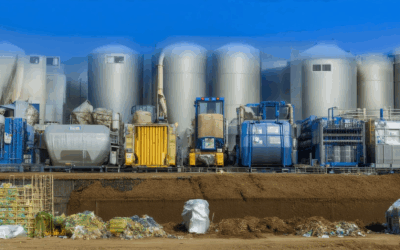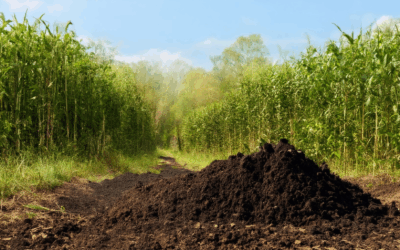Modern farming faces significant challenges, from resource depletion to environmental concerns. Among the most promising solutions is the adoption of zero-waste agricultural inputs, a practice that not only enhances sustainability but also offers economic benefits for farmers. As the demand for eco-conscious practices grows, understanding the role of zero-waste agricultural inputs becomes essential for fostering resilient and productive farming systems. These inputs aim to minimize waste while maximizing resource efficiency, making them a cornerstone of sustainable agricultural practices. By reducing reliance on conventional inputs and embracing innovative solutions, farmers can contribute to biodiversity conservation and reduce their environmental footprint. This article explores how zero-waste agricultural inputs fit into modern farming systems, their contributions to sustainable practices, and the tangible benefits they bring to both producers and the planet.
Key Takeaways
- Resource Efficiency
- Precision agriculture reduces waste through optimized water and pesticide use.
- Crop rotation enhances soil health and cuts reliance on synthetic fertilizers.
- Organic Waste Management
- Composting transforms kitchen scraps and manure into nutrient-rich fertilizers.
- Biodegradable practices minimize plastic waste, supporting sustainable farming goals.
- Integrated Farm Systems
- Livestock integration recycles animal waste as fertilizer, maximizing resource use.
- Sustainable livestock housing designs minimize waste and environmental impact.
- Processing and Storage
- Solar drying reduces energy use and extends crop shelf life.
- Efficient conversion processes minimize byproducts and waste.
- Distribution and Marketing
- Selling closer to production sites reduces transportation waste and emissions.
- Sustainable packaging uses recyclable or biodegradable materials.
- Biochar Production
- Transforming organic waste into biochar boosts soil health and carbon sequestration.
By integrating these strategies, zero-waste agricultural systems achieve environmental sustainability while improving farm productivity. Explore innovative solutions with Pyrolysium, supporting circular economy practices in agriculture.

What Are Zero-Waste Agricultural Inputs?
Zero-waste agricultural inputs are practices and resources designed to minimize waste, optimize resource use, and promote sustainable farming methods. These approaches focus on reducing environmental impact while enhancing productivity and long-term soil health.
Key Components of Zero-Waste Agricultural Inputs
- Crop Rotation :
Crop rotation involves growing different types of crops in sequence to maintain soil fertility and reduce the need for synthetic fertilizers. This method minimizes waste by preventing soil degradation and reducing chemical runoff. - Composting :
Composting is the process of converting organic waste materials, such as kitchen scraps or animal manure, into nutrient-rich soil amendments. This practice reduces the need for chemical fertilizers and enhances soil structure and fertility. - Organic Fertilizers :
Organic fertilizers, such as compost and fish emulsion, provide slow-release nutrients and improve soil health without the environmental harm caused by synthetic chemicals. - Integrated Pest Management (IPM) :
IPM combines biological control agents, crop rotation, and monitoring to manage pests effectively. This approach reduces the reliance on harmful pesticides and promotes biodiversity. - Cover Cropping :
Cover crops, like clover or rye, are planted to protect soil from erosion, suppress weeds, and add nitrogen to the soil. This practice enhances sustainability and reduces the need for external fertilizers. - Local Sourcing :
Purchasing agricultural inputs from local suppliers or producing them on-farm reduces transportation emissions and supports regional economies, contributing to a lower carbon footprint. - Water Conservation :
Techniques like drip irrigation and rainwater harvesting help conserve water and reduce waste, while also preserving this essential resource for future generations.
Benefits of Zero-Waste Agricultural Inputs
- Improved Soil Health : Enhanced nutrient availability and better soil structure lead to more resilient crops and healthier ecosystems.
- Reduced Chemical Use : Minimizes exposure to harmful chemicals, protecting biodiversity and water quality.
- Cost-Effective : Many zero-waste practices lower long-term costs through improved resource efficiency and reduced input waste.
- Environmental Impact Reduction : Decreases greenhouse gas emissions and non-point source pollution.
Prominent Competitors in the Field
- Pyrolysium : Specializes in sustainable living and eco-friendly technologies, including waste-to-resource solutions like biochar production.
- Ecosia : Offers sustainable agriculture resources, including seed banks and eco-friendly farming tools.
- Rodale Institute : Conducts research on organic farming practices and sustainable land management.
- AgriEarth : Provides carbon farming solutions and sustainable agricultural practices to combat climate change.
By adopting these practices, farmers can create a more sustainable and efficient agricultural system that prioritizes environmental stewardship and long-term productivity.
How Do Zero-Waste Agricultural Inputs Contribute to Sustainable Farming?
Zero-waste agricultural inputs play a pivotal role in promoting sustainable farming practices by minimizing waste, conserving resources, and enhancing environmental stewardship. Here’s a breakdown of their contributions:
- Sustainability of Natural Resources :
By reducing material waste, zero-waste agricultural inputs help preserve finite natural resources such as water, soil, and energy. This ensures long-term viability of agricultural systems and reduces the strain on ecosystems. - Improved Farm Efficiency :
These inputs enhance operational efficiency by optimizing resource use. Techniques like composting organic waste or utilizing biodegradable packaging reduce reliance on non-renewable materials and lower production costs. - Climate Change Mitigation :
Minimizing waste decreases transportation emissions and reduces the need for synthetic fertilizers and pesticides, which are often energy-intensive and environmentally harmful. This contributes to lowering greenhouse gas emissions. - Soil Health and Fertility :
Practices like crop rotation and composting enhance soil health, making farms more resilient to environmental challenges. This supports biodiversity and improves yields over time. - Support for Precision Agriculture :
Advanced technologies enabled by zero-waste principles allow for precise application of inputs, further reducing waste and enhancing resource utilization. - Economic Viability :
Farmers adopting zero-waste methods often experience cost savings due to reduced input waste and increased resource efficiency, making farming operations more financially sustainable.
Examples of zero-waste agricultural practices include composting manure, using crop residues as mulch, and employing drip irrigation systems to conserve water. These methods not only reduce waste but also foster a culture of resourcefulness and sustainability on the farm.
By embracing zero-waste agricultural inputs, farmers can create a more harmonious balance between productivity and ecological health, paving the way for a brighter, more sustainable future in agriculture.

Why Zero-Waste Agricultural Inputs Are Important for Sustainable Farming
Zero-waste agricultural inputs play a pivotal role in promoting sustainable farming practices. These inputs are specifically designed to minimize waste, optimize resource usage, and align with environmentally friendly practices. Here are the key reasons why they are essential:
- Environmental Protection: By reducing the generation of waste, zero-waste inputs help protect soil health, water quality, and biodiversity. Traditional agricultural practices often rely on synthetic chemicals that can contaminate the environment, whereas zero-waste methods focus on natural, biodegradable alternatives.
- Resource Efficiency: These inputs enhance resource efficiency by ensuring that every component is utilized effectively. This reduces the strain on natural resources and minimizes the environmental impact associated with excessive resource consumption.
- Economic Viability: Adoption of zero-waste practices can lead to cost savings through optimized input use and reduced waste management expenses. Additionally, it supports farmers in meeting regulatory requirements and adapting to market demands for sustainable products.
- Climate Change Mitigation: The production of zero-waste inputs often involves processes with lower energy consumption and fewer greenhouse gas emissions compared to conventional methods. This contributes to lowering the overall carbon footprint of farming operations.
- Biodiversity and Ecosystem Health: By reducing chemical use and waste, these practices promote healthier ecosystems and support beneficial insects, birds, and microorganisms that sustain agricultural productivity.
- Food Security: Sustainable farming methods, enabled by zero-waste inputs, enhance resilience against pests, diseases, and climate variability, ensuring stable food production and minimizing supply chain disruptions.
Pyrolysium advocates for the adoption of these practices to foster a more sustainable future. We encourage farmers and stakeholders to explore innovative solutions like biochar production, organic composting, and regenerative farming techniques to maximize resource utilization and minimize waste. https://pyrolysium.org/

How Do Zero-Waste Agricultural Inputs Function Within a Farm System?
Zero-waste agricultural inputs are designed to optimize resource use and minimize environmental impact throughout the farming process. Here’s a breakdown of how they operate:
1. Resource Efficiency
- Precision Agriculture : Utilizes technology to monitor and manage resources like water, fuel, and pesticides efficiently, reducing waste.
- Crop Rotation : Enhances soil health and minimizes reliance on synthetic fertilizers, which often contribute to waste through excessive packaging.
2. Organic Waste Management
- Composting : Converts organic waste, such as kitchen scraps and animal manure, into nutrient-rich fertilizers, reducing the need for chemical additives.
- Biodegradable Practices : Uses biodegradable mulch and packaging to minimize plastic waste, aligning with sustainable farming goals.
3. Integrated Farm Systems
- Livestock Integration : Combines crops with animals to maximize resource utilization, where animal waste is recycled as fertilizer.
- Sustainable Livestock Housing : Designs structures that minimize waste generation and environmental impact, such as low-waste feed systems.
4. Processing and Storage
- Solar Drying : Reduces energy consumption and extends shelf life of crops, minimizing waste from spoilage.
- Agricultural Processing : Implements efficient techniques to convert raw materials into valuable outputs with minimal byproducts.
5. Distribution and Marketing
- Local Markets : Focuses on selling products closer to production sites to reduce transportation-related waste and emissions.
- Sustainable Packaging : Uses recyclable or biodegradable materials to minimize waste during distribution.
6. Biochar Production
- Waste Conversion : Transforms organic waste into biochar, a carbon-rich material that enhances soil health and sequesters carbon, supporting sustainable practices.
By integrating these strategies, zero-waste agricultural systems promote environmental sustainability while maintaining productive farming operations. They exemplify a holistic approach to farming that values resource efficiency and ecological balance.
Learn more about sustainable farming practices and biochar production.
How Zero-Waste Agricultural Inputs Enhance Farm Sustainability
Zero-waste agricultural inputs play a pivotal role in enhancing sustainability by minimizing environmental impact, conserving resources, and promoting efficient farming practices. Here’s a breakdown of their contributions:
Reducing Environmental Impact
Zero-waste approaches in agriculture focus on minimizing waste generation throughout the supply chain. By utilizing organic compost instead of synthetic fertilizers, farmers can reduce chemical runoff and improve soil health. Practices like crop rotation and cover cropping further mitigate waste, preventing soil degradation and enhancing carbon sequestration.
Conserving Water and Energy
These inputs often require less water and energy compared to conventional methods. For instance, drip irrigation systems, which are part of zero-waste practices, efficiently use water, reducing evaporation and runoff. Solar-powered irrigation systems take this a step further by harnessing renewable energy, lowering the farm’s carbon footprint.
Promoting a Circular Economy
Zero-waste agricultural inputs encourage a circular economy by repurposing waste materials. Crop residues can be converted into biogas through anaerobic digestion or biochar via pyrolysis, both of which are processes highlighted by organizations like Pyrolysium . These conversions not only reduce landfill waste but also create valuable resources for farming and energy production.
Enhancing Biodiversity
By adopting practices that mimic natural ecosystems, zero-waste methods support biodiversity. Techniques such as agroforestry and integrated pest management promote wildlife habitats and reduce pesticide use, fostering a healthier ecosystem that supports pollinators and beneficial insects.
Building Farm Resilience
These inputs contribute to farm resilience by reducing reliance on external inputs. Farms that adopt zero-waste practices are better equipped to withstand environmental challenges, such as droughts or pests, by maintaining robust soils and diverse crop rotations.
Economic Benefits
Farmers who embrace zero-waste agricultural inputs often experience cost savings and increased profitability. Lower input costs and improved resource efficiency make farming more sustainable in the long term, aligning with global efforts to combat climate change and promote eco-friendly practices.
By integrating zero-waste agricultural inputs, farmers can significantly enhance sustainability while benefiting economically. This shift not only protects the environment but also ensures the viability of farming for future generations.

What Are the Benefits of Implementing Zero-Waste Agricultural Inputs?
Zero-waste agricultural inputs offer a range of benefits that extend beyond environmental sustainability to economic efficiency and operational excellence. Here’s a breakdown of the key advantages:
- Reduction in Waste Generation: By minimizing the use of excess materials and optimizing resource utilization, zero-waste practices significantly reduce agricultural waste. This not only lowers landfill dependency but also conserves natural resources.
- Cost Efficiency: Over time, adopting zero-waste techniques can lead to cost savings through reduced material waste and optimized resource use. Farmers often find that they spend less on inputs while achieving comparable or even higher yields.
- Improved Productivity: Efficient use of resources often translates to better crop yields and healthier livestock. For instance, composting organic waste can enrich soil, leading to stronger plant growth and higher resistance to pests and diseases.
- Sustainable Farming Practices: Zero-waste methods align closely with sustainable agriculture by promoting resource conservation and reducing environmental impact. Techniques like crop rotation and composting contribute to long-term soil health and biodiversity.
- Resource Conservation: Implementing zero-waste systems helps preserve water, energy, and nutrients. Water-saving irrigation methods and nutrient-rich fertilizers not only reduce costs but also protect vital natural resources.
By embracing zero-waste agricultural inputs, farmers can create a more resilient and efficient farming system that benefits both the environment and their operations. Learn more about how Pyrolysium supports sustainable farming practices and innovative waste management solutions.




0 Comments